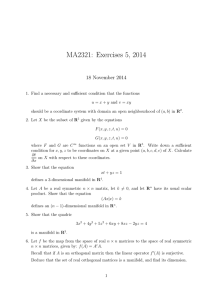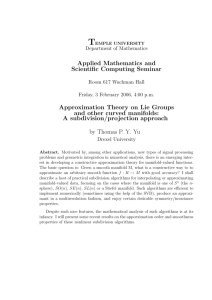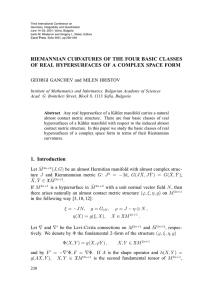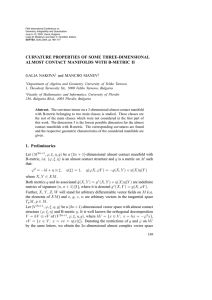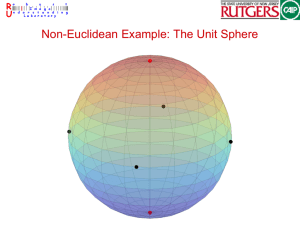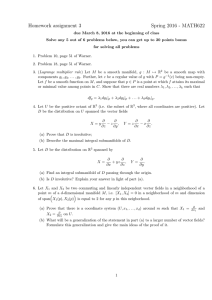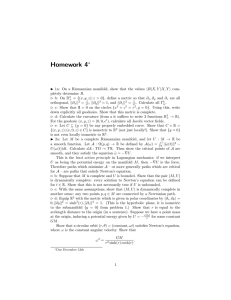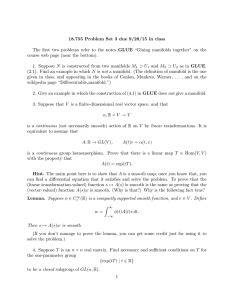An isoparametric function on almost k-contact manifolds Adara M. BLAGA
advertisement
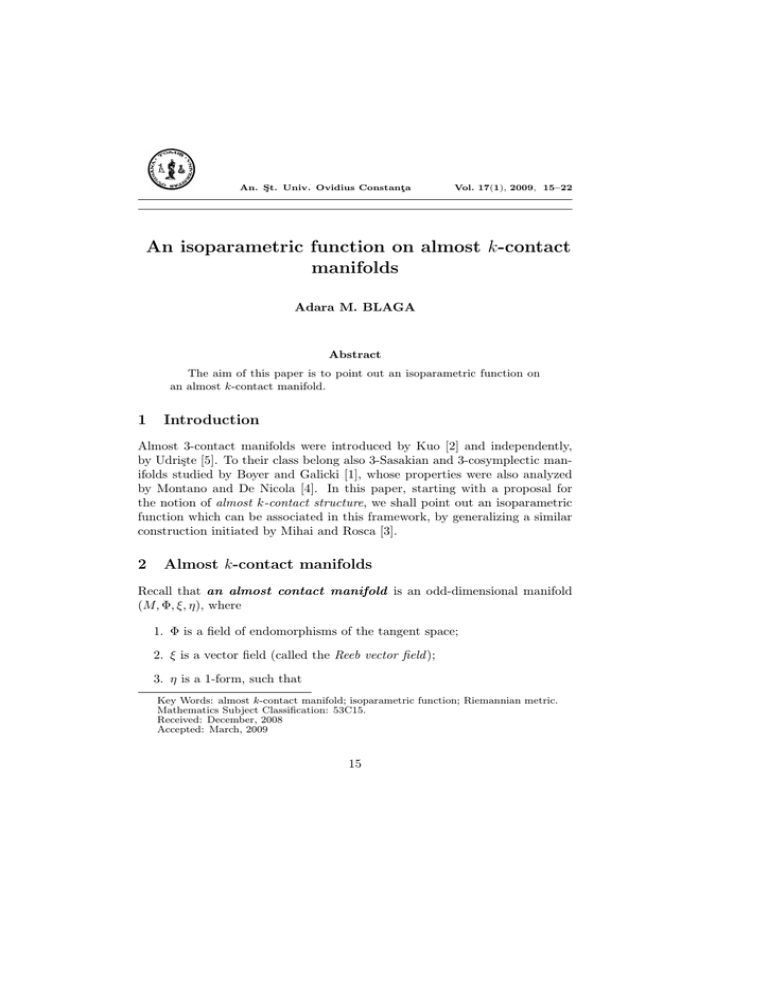
An. Şt. Univ. Ovidius Constanţa
Vol. 17(1), 2009, 15–22
An isoparametric function on almost k-contact
manifolds
Adara M. BLAGA
Abstract
The aim of this paper is to point out an isoparametric function on
an almost k-contact manifold.
1
Introduction
Almost 3-contact manifolds were introduced by Kuo [2] and independently,
by Udrişte [5]. To their class belong also 3-Sasakian and 3-cosymplectic manifolds studied by Boyer and Galicki [1], whose properties were also analyzed
by Montano and De Nicola [4]. In this paper, starting with a proposal for
the notion of almost k-contact structure, we shall point out an isoparametric
function which can be associated in this framework, by generalizing a similar
construction initiated by Mihai and Rosca [3].
2
Almost k-contact manifolds
Recall that an almost contact manifold is an odd-dimensional manifold
(M, Φ, ξ, η), where
1. Φ is a field of endomorphisms of the tangent space;
2. ξ is a vector field (called the Reeb vector field );
3. η is a 1-form, such that
Key Words: almost k-contact manifold; isoparametric function; Riemannian metric.
Mathematics Subject Classification: 53C15.
Received: December, 2008
Accepted: March, 2009
15
16
Adara M. Blaga
• Φ2 = −IΓ(T M ) + η ⊗ ξ
• η(ξ) = 1,
where IΓ(T M ) denotes the identity on the Lie algebra of vector fields.
Proposition 1 Any almost contact manifold (M, Φ, ξ, η) admits a Riemannian metric g (called compatible metric) with the properties:
g(Φ(X), Φ(Y )) = g(X, Y ) − η(X)η(Y ),
g(ξ, X) = η(X),
for any X, Y ∈ Γ(T M ).
We call (M, Φ, ξ, η, g) almost contact metric manifold . In this case,
the Reeb vector field ξ is orthonormal with respect to g [g(ξ, ξ) = η(ξ) = 1].
A natural generalization of almost 3-contact manifold [4] is given by the
following definition:
Definition 1 An almost k-contact manifold is an (n + k + nk)-dimensional manifold M with k almost contact structures (Φ1 , ξ1 , η1 ),...,(Φk , ξk , ηk )
such that:
Pk
• Φi ◦ Φj = −δij IΓ(T M ) + ηj ⊗ ξi + l=1 εijl Φl
• ηi (ξj ) = δij ,
for any i, j, l ∈ {1, ..., k}, where εijl is the totally antisymmetric symbol.
Pk
Pk
It follows that Φi (ξj ) =
l=1 εijl ξl and ηi ◦ Φj =
l=1 εijl ηl , for any
i, j ∈ {1, ..., k}. A similar computation like in the almost contact case leads
us to Φi (ξi ) = 0 and ηi ◦ Φi = 0, for any i ∈ {1, ..., k}. Consider now the case
i 6= j. Then
k
X
εijl Φl
Φi ◦ Φj = ηj ⊗ ξi +
l=1
and computing this relation on ξi and respectively ξj , we obtain
k
X
εijl Φl (ξi ) = Φi (Φj (ξi )) = ξj ,
l=1
for any i 6= j. Multiplying ξl = Φj (Φl (ξj )) with εijl and summing over l, we
get
k
k
k
X
X
X
εijl Φl (ξj )) = −Φj (ξi ).
εijl Φj (Φl (ξj )) = Φj (
εijl ξl =
l=1
l=1
l=1
17
An isoparametric function
Then
Φi (ξj ) = −
k
X
εjil ξl =
k
X
εijl ξl .
l=1
l=1
Computing Φ2i = −IΓ(T M ) + ηi ⊗ ξi for Φj (X), with arbitrary X ∈ Γ(T M ),
we obtain
−Φj (X) + ηi (Φj (X))ξi
=
Φ2i (Φj (X)) = Φi [(Φi ◦ Φj )(X)]
=
Φi [ηj (X)ξi +
k
X
εijl Φl (X)]
l=1
k
X
=
εijl (Φi ◦ Φl )(X).
l=1
It follows that
(ηi ◦ Φj )(X)ξi
=
Φj (X) +
k
X
εijl (Φi ◦ Φl )(X)
l=1
=
Φj (X) +
k
X
εijl [−δil X + ηl (X)ξi +
Φj (X) +
k
X
εilp Φp (X)]
p=1
l=1
=
k
X
εijl ηl (X)ξi − Φj (X) =
k
X
εijl ηl (X)ξi ,
l=1
l=1
for any X ∈ Γ(T M ). Applying ηi , we find
(ηi ◦ Φj )(X) =
k
X
εijl ηl (X),
l=1
for any X ∈ Γ(T M ).
Proposition 2 Any almost k-contact manifold (M, Φi , ξi , ηi )1≤i≤k admits a
Riemannian metric g compatible with each of the k almost contact structures:
g(Φi (X), Φi (Y )) = g(X, Y ) − ηi (X)ηi (Y ),
g(ξi , X) = ηi (X),
(1)
for any X, Y ∈ Γ(T M ), i ∈ {1, ..., k}.
We call (M, Φi , ξi , ηi , g)1≤i≤k almost k-contact metric manifold . In
this case, the Reeb vector fields ξ1 ,...,ξk are orthonormal with respect to g
[g(ξi , ξj ) = ηi (ξj ) = δij , for any i, j ∈ {1, ..., k}].
18
3
Adara M. Blaga
Isoparametric function
Let (M, Φi , ξi , ηi , g)1≤i≤k be an almost k-contact metric manifold and define
H := ∩ki=1 ker ηi the horizontal distribution. Then the tangent bundle splits
into the orthogonal sum of the horizontal and vertical distributions,
T M = H⊕ < ξ1 , ..., ξk > .
Consider the vector field ξ :=
1-form η := iξ g. Then
Pk
i=1
λi ξi , λi ∈ C ∞ (M ) and define the
k
k
k
X
X
X
λi ηi (X),
λi g(ξi , X) =
λi ξi , X) =
η(X) = iξ g(X) = g(ξ, X) = g(
i=1
i=1
i=1
for any X ∈ Γ(T M ) and in particular for X = ξ,
η(ξ) =
k
X
i=1
λi ηi (ξ) =
k
X
λi g(ξi , ξ) = g(ξ, ξ) =k ξ k2 .
(2)
i=1
Let ∇ be the Levi-Civita connection associated to g. From Cartan’s structure equations, for {ei }1≤i≤k an orthonormal frame and θ the local connection
form, we have ∇e = θ ⊗ e, with θij = λi ηj − λj ηi , i, j ∈ {1, ..., k}. If we assume
that ξ defines a skew symmetric connection, then θij (ξ) = 0 and dηi = η ∧ ηi ,
i ∈ {1, ..., k}. It follows
0 = d2 ηi = d(η ∧ ηi ) = dη ∧ ηi − η ∧ dηi = dη ∧ ηi − η ∧ (η ∧ ηi ) = dη ∧ ηi ,
so
0 = (dη ∧ ηi )(X, Y ) = dη(X)ηi (Y ) − dη(Y )ηi (X),
for any X, Y ∈ Γ(T M ). In particular, for X = ξi , Y = ξj , i 6= j,
0 = dη(ξi )ηi (ξj ) − dη(ξj )ηi (ξi ),
we find dη(ξj ) = 0, for any j ∈ {1, ..., k}. Now, for Y = ξi ,
0 = dη(X)ηi (ξi ) − dη(ξi )ηi (X) = dη(X),
for any X ∈ Γ(T M ) and so dη = 0.
Following the ideas of Mihai and Rosca [3], we shall prove that on an almost
k-contact manifold, k ξ k2 is an isoparametric function. Let ♭(X) := iX g and
♯ := ♭−1 be the musical isomorphisms.
19
An isoparametric function
Assume that ∇λi = f ξi , f ∈ C ∞ (M ). Then ♯(dλi ) = f ξi ⇔ ♭−1 (dλi ) =
f ξi ⇔ dλi = ♭(f ξi ) = if ξi g = f iξi g = f ηi and
0
= d2 λi = d(f ηi ) = df ∧ ηi + f dηi
= df ∧ ηi + f η ∧ ηi = (df + f η) ∧ ηi
implies df + f η = 0.
Set 2λ =k ξ k2 [= g(ξ, ξ)]. Then
dλ
= d(
=
k
k
X
X
X
g(ξ, ξ)
1
1
λj ξj )] = d[
λi ξi ,
) = d[g(
λi λj g(ξi , ξj )]
2
2
2
j=1
i=1
1
d[
2
X
λi λj ηi (ξj )] =
1≤i,j≤k
1
d[
2
X
1≤i,j≤k
λi λj δij ] =
1≤i,j≤k
X
X
1 X
(
2λi dλi ) =
=
λi dλi =
λi f ηi
2
1≤i≤k
1≤i≤k
1≤i≤k
X
= f
λi ηi = f η
1 X 2
d[
λi ]
2
1≤i≤k
1≤i≤k
and d(f + λ) = df + dλ = df + f η = 0 implies f + λ = c(constant).
From the structure’s equations follows that
∇Z ξi = λi
k
X
ηj (Z)ξj − ηi (Z)ξ,
(3)
j=1
for any Z ∈ Γ(T M ), i ∈ {1, ..., k} [3]. Therefore,
Lemma 1 For any Z ∈ Γ(T M ), ∇Z ξ = (2λ + f )
Pk
j=1
ηj (Z)ξj − η(Z)ξ.
20
Adara M. Blaga
Proof. Indeed,
∇Z ξ
=
k
X
[λi ∇Z ξi + Z(λi )ξi ]
i=1
=
k
X
[λi (λi
i=1
=
k
X
ηj (Z)ξj − ηi (Z)ξ) + Z(λi )ξi ]
j=1
k
k
k
X
X
X
dλi (Z)ξi
ηj (Z)ξj ] − η(Z)ξ +
λ2i ][
[
i=1
j=1
i=1
k
X
= k ξ k2 [
ηj (Z)ξj ] − η(Z)ξ +
f ηi (Z)ξi
i=1
j=1
=
k
X
k
X
ηi (Z)ξi ] − η(Z)ξ,
(2λ + f )[
i=1
for any Z ∈ Γ(T M ).
Theorem 1 Let on an almost k-contact metric manifold M a number of ksmooth functions λi such that for all i, the gradient vector field ∇λi is parallel
with ξ with the same factor f ∈ C ∞ (M ). Then, for the vector field ξ :=
Pk i
i=1 λi ξi , its norm is an isoparametric function on M .
Proof. Since {ξi } is an orthonormal set for g we have:
2λ =
k
X
λ2i
i=1
and then:
k
k
X
X
λi ξi ) = (c − λ)ξ.
λi ξi ) = (c − λ)(
∇λ = f (
(4)
i=1
i=1
Therefore,
k ∇λ k2 = (c − λ)2 2λ.
(5)
div(∇λ) = (c − λ)divξ − ξ(λ),
(6)
1
ξ(g(ξ, ξ)) = g(∇ξ ξ, ξ).
2
(7)
Then,
but
ξ(λ) =
21
An isoparametric function
From:
∇ξ ξ = (λ + c)ξ − η(ξ)ξ = (c − λ)ξ,
(8)
it results:
div(∇λ) = (c − λ)[kc +
k−2
2λ − 2λ] = (c − λ)[kc + (k − 4)λ],
2
(9)
which, for k = 3 gives the relation (2.24) of Rosca-Mihai.
Acknowledgments
I wish to express my thanks to the referees for their useful remarks.
References
[1]
C. Boyer, K. Galicki, 3-Sasakian manifolds. Surveys in differential geometry: essays
on Einstein manifolds, Surv. Differ. Geom., VI, Int. Press, Boston, MA 1999, pp.
123–184.
[2]
Y. Y. Kuo, On almost contact 3-structure, Tohoku Math. J., 22 (1970), 235–332.
[3]
A. Mihai, R. Roşca, On vertical skew symmetric almost contact 3-structures, J. Geom.,
82(2005), 146–155.
[4]
B. Cappelletti Montano, A. De Nicola, 3-Sasakian manifolds, 3-cosymplectic manifolds
and Darboux theorem, J. Geom. Phys., 57(2007), 2509–2520.
[5]
C. Udrişte, Structures presque coquaternioniennes, Bull. Math. R. S. Roumanie,
13(61)(1969), 487–507.
Adara M. Blaga
Department of Mathematics and Computer Science
West University of Timişoara
Bld. V. Pârvan nr.4, 300223 Timişoara, România
adara@math.uvt.ro
22
Adara M. Blaga
